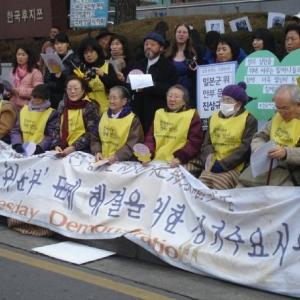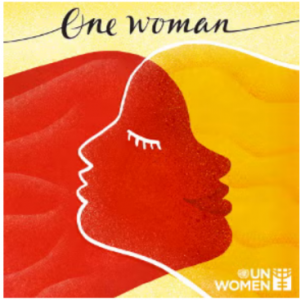Aimee Kang, office manager at Sojourners, has master's degrees in divinity and theology from Emory University, and is being ordained as a United Methodist deacon.
Posts By This Author
Refusing to be Forgotten
Korean sex slaves—so-called "comfort women"—stand up for respect and justice.
TORU HASHIMOTO, the mayor of Osaka and co-leader of the Japanese Restoration Party, has been known for his provocative statements. In May, while speaking with reporters on Japanese wartime behavior, he endorsed rape and sexual enslavement, saying, “When soldiers are risking their lives by running through storms of bullets, and you want to give these emotionally charged soldiers a rest somewhere, it’s clear that you need a comfort-women system.” These comments drew international condemnation, but they also revealed the all-too-familiar interlocking of sexism, militarism, and sexual violence. Far too often, the idea of a greater “noble cause” is used to justify the sacrifice of women to a military sexual slavery system.
During World War II, historians estimate that 100,000 to 200,000 Korean women and girls, ages 11 to 30, along with women and girls from China, the Philippines, Indonesia, and Taiwan, were kidnapped or falsely promised jobs and taken to various locations to serve as “comfort women”—the euphemism for sexual slaves. They “served” an average of 30 to 40 soldiers a day and suffered through beatings, venereal disease, forced abortions, mental anguish, and often death. At the end of the war, these women and girls were killed, forced into suicide, or abandoned. Of the few who were able to return to their homeland, many suffered social alienation, humiliation, poverty, STDs, and endless mental anguish.
The Japanese government had largely denied the existence of Japanese military sexual slavery until 20 years ago, when it offered a statement of apology. The apology was seen as empty by many people, as Japanese politicians and revisionist historians not only reneged on the apology but sought to omit the tragedy from the telling of Japanese history. In response, surviving Korean “comfort women” or halmulni (a term of endearment and respect meaning grandmother) have gathered every Wednesday since 1992 in front of the Japanese embassy in Seoul as a reminder that they demand to be seen, heard, and offered a genuine apology.
Film: I Was Worth 50 Sheep
“One Woman” Song — UN International Women’s Day
Written for U.N. Women to celebrate International Women’s Day, “One Woman” is sung by acclaimed singers and musicians to celebrate the mission and work to improve women’s lives around the world.
President Obama Signs VAWA (VIDEO)
Yesterday, President Obama signed a reauthorization of the 2013 VAWA act. The Senate passed the bill on Feb. 12 and, the House passed the Senate bill on Feb. 28.
Did You Watch It? "Makers: Women Who Make America"
Last night, PBS aired Makers: Women Who Make America a joint effort documentary by PBS and AOL, which chronicles the last 50 years of the women’s liberation movement in the United States.
LATEST ON VAWA: House Backing Down
Women To See Higher Prices For Long-Term Care Insurance
House Introduces Own VAWA Bill
On Friday, House GOP leaders released their own Violence Against Women Act bill that strips protection for the LGBT community by removing all mention of sexual orientation and gender identity from the bill and also adding a loophole for Native American victims.
Negative Impact of the Sequester on Women and Families
According to a new state-by-state analysis released today by the Center for American Progress, if Congress fails to act by March 1, millions of women and children across the United States could lose the critical support and services they need.
South Korea’s First Female President Sworn into Office
Personal Encounters Lead to Push for Women’s Advocacy
Melanne Verveer, the first U.S. ambassador for Global Women’s issues has been urging governments and leaders around the world on improving the lives of women.
As she begins her new journey as the Executive Director of the Georgetown Institute for Women, Peace and Security, she reflected on her tenure as ambassador and the personal encounters that she had along the way that drove her to raise awareness on the sufferings of women. When asked about her guiding principle of women’s advocacy, Verveer cited a conversation she had with an Afghan woman in Kabul,
Please don’t see us as victims but as the women leader we are
To read more about Melanne Verveer’s leadership in empowering women, read here.
Egyptian Women Speak Out Against Sexual Violence
Increase in Border Enforcement Detrimental to Women and Children
Migration Policy Institute (MPI) released its “Immigration Enforcement in the United States” report last month that reveals an increase in spending for the Immigration Reform and Control Act (IRCA) due to the “enforcement first” approach to immigration.
The report's findings are shocking. The U.S. government now spends more on immigration enforcement than on all other major federal criminal law enforcement agencies combined and immigration enforcement is the federal government's highest criminal law enforcement priority. Surprisingly, at a time when our government must be fiscally conservative and unauthorized immigration has abated, the call to increase spending on border enforcement is as loud as ever.
This increase in spending should guarantee better trained officers and ensure that the basic human rights of all people respected. However, according to various reports families are separated, victims of domestic violence do not receive the protection that they need, pregnant asylum seekers do not receive the prenatal care that they need, and children are held in detention centers with adults. Read here for more.
Afghan Women and Girls Victims Increases, UN Says
On Tuesday, the United Nations reported that the number of civilian casualties fell for the first time since the United Nations Assistance Mission in Afghanistan (UNAMA) started measuring casualties in 2007. However, there has been a increase in the number of Afghan women and girls killed or injured in the last year while going about their daily lives.
Senate Passes Violence Against Women Act - Now To House
The Senate passed the Violence Against Women Act, picking up 16 additional Republican support and passing the bill 78 to 22.
Created in 1994, VAWA exists to help programs and services of domestic violence, dating violence and stalking. While it typically gets reauthorized easily, Congress failed to do so last year because of provisions in the Senate bill that included protection for LGBT, Native American and limited provisions to undocumented immigrants. The VAWA bill that was passed today includes protection for LGBT and Native Americans but protection for undocumented immigrants was not included. A few amendments were added on to the bill which includes a provision targeting human trafficking and a provision to ensure child victims of sex trafficking are eligible for grant assistance.
The bill now heads to the House where it is unclear how they plan to proceed. As Vice President Joe Biden said in a statement,
“Delay isn’t an option when three women are still killed by their husbands of boyfriends every day. Delay isn’t an option when countless women still live in fear of abuse, and when one in five have been victims of rape. This issue should be beyond debate—the House should follow the Senate’s lead and pass the Violence Against Women Act right away.”
To Protect and To Heal
"The Cry of Tamar: Violence Against Women and the Church's Response"
OVER DINNER my friends and I reflected recently on the headlines that surprised us last year. A few were especially painful: former Rep. Todd Akin's comment that "legitimate" rapes do not lead to pregnancies; failed Senate candidate Richard Mourdock's comment that a pregnancy from rape is "something that God intended to happen"; and the Violence Against Women Act (VAWA), in effect since 1994, ending as the 112th Congress closed without reauthorizing it. All reminded me why the second edition of The Cry of Tamar: Violence Against Women and the Church's Response, by Pamela Cooper-White, is still needed almost 20 years since its first edition.
The Cry of Tamar reads as a graduate textbook on providing pastoral support for the victims of violence against women. It weaves pastoral counseling methods and social and psychological theories in dialogue with biblical exegesis and constructive theology to give clergy, pastoral caregivers, and religious leaders tools to help victims of violence and the larger Christ-community.
The story of Tamar, a girl raped 3,000 years ago in Jerusalem, frames and guides the book's goal of providing healing to the girls and women who are victims of violence today.
Advocacy, prevention, and intervention to stop violence against women have advanced since the 1995 first edition. Religious communities and congregations have become more informed about how to care and respond to both victims and perpetrators. But the need for increased awareness and education is ongoing. This second edition is an effort to update the conversation and keep it on the table.
Love in Action on Valentine's Day
Feb. 14 "One Billion Rising" events aim to end violence against women.
TAMAR’S LIFE COULD have been different. A princess of David’s kingdom, she would have married into a wealthy family. But that all changed with the only recorded event of her life, described in 2 Samuel 13: A family member forced himself on her, then turned her out of his room. She cried aloud for all to hear, but the one person who did hear, her brother Absalom, counseled her to not take what happened “to heart.”
Rarely preached from the pulpit, this is a story that needs to be heard, because what happened to Tamar happens to one in three women and girls today. They are our mothers, sisters, aunts, daughters, selves—women and girls harmed by violence and silence. Worldwide, violence against women and girls takes many forms: sexual violence, sexual harassment, trafficking, “honor killings,” and other forms of murder. Such violence distorts the image of God that is in all of humanity. Victimization is never God’s will—fullness of life is. The church needs to help create intentional safe spaces so that healing can begin.
On Feb. 14, 2013, a movement of grassroots, national, and international organizations in more than 170 countries will take part in One Billion Rising, a day of action to reveal the collective strength and solidarity of those who demand an end to violence against women. Initiated by V-Day, the advocacy group founded by Vagina Monologues playwright Eve Ensler, this event invites the world to rise up to stop violence toward women and girls.
The Unworthy Table
I love food. I love food even more when it's shared with people. Some of my fondest memories with friends and family happened while sharing food. My husband and I shared our first date over a meal, and we got engaged over a meal. There's something about sitting around a table partaking in sustenance for our bodies that also fills our soul and our hearts. That's probably why I love communion so much.
So I was struck by Paul’s anger over food in 1 Corinthians 11. Granted, Paul comes off angry in other letters as well, but this one I decided to linger on for awhile because of verse 27: "Whoever, therefore, eats the bread or drinks the cup of the Lord in an unworthy manner will be answerable for the body and blood of the Lord."
Paul's letter is directed to a community in Corinth that was made up of the poor, the working class, and the rich. They lived together, shared communion with each other, and sought to be a community that reflected Christ. Now, this doesn’t seem too different from what we do at church today. But unlike how we celebrate communion — as it’s own “event” during service — for the 1st century Christians, communion was part of a real meal.
So what could be so "unworthy" about this shared meal?
Good Friday Meditation: Body. Broken. Exploited.
Here I am meditating on the broken body that holds the divine and the human in the mysterious way that only the Omniscient understands.
Today, I reflect on this body of Christ. It beckons me and I’m reminded once again that the violence and death that happened on that dark day lingers still.
It lingers still because we all are created in the image of God.



